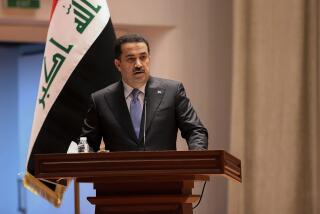Syria’s Leader Staying Longer in Tehran : Diplomacy: Assad apparently is trying to get Iran to take a tougher line against Iraq.
- Share via
AMMAN, Jordan — Syrian President Hafez Assad, who is believed to be trying to persuade Iran to take a harder line against Iraq in the Persian Gulf crisis, has extended his visit to Tehran into a fourth day, the Iranian news agency reported Monday.
No details of Assad’s talks with Iranian President Hashemi Rafsanjani have been disclosed, but his visit was extended “due to the importance of the issues under discussion and the need to complete consultations,” the Islamic Republic News Agency said.
The Syrian leader, Iran’s key Arab ally and a rival of Iraqi President Saddam Hussein, met for talks in Damascus with Secretary of State James A. Baker III earlier this month. The United States has voiced increasing concern that Iran may not abide by the U.N.-sponsored trade embargo on Iraq.
On Sunday, Rafsanjani, at a banquet for Assad, again rejected a suggestion by Baker that a regional security structure be considered to keep Hussein in check after the current crisis is resolved, calling it an “arrogant scheme.” Iran has interpreted Baker’s suggestion as an attempt by Western powers to keep a long-term foothold in the oil-producing area.
“We should not allow foreign forces and the hegemonist powers, who are all geared up to tighten their grip on vital oil resources, the Persian Gulf and the Red Sea, to remain in the region,” the Iranian news agency quoted Rafsanjani as saying.
Syria, which has sent 4,000 troops to Saudi Arabia and pledged to send a full armored division of up to 15,000 additional troops, also insists that the American-dominated Western forces must leave the region when the crisis is resolved. Both Syria and Iran have demanded an Iraqi withdrawal from Kuwait.
The Iranian media have reflected political divisions within the country, with radical-line newspapers focusing on the emotive issue of the deployment of Western troops in Saudi Arabia, the site of Islam’s holy cities of Mecca and Medina. On the other hand, Tehran Radio, controlled by the brother of the centrist president, who favors improved ties with the West, sees a positive aspect to the Syrian presence there.
“Syria,” a Tehran Radio commentary said, “believes that by sending a few military units to Saudi Arabia to confront the Iraqi incursion, it is possible to prevent the expansion of the U.S.-led Western influence in the region.”
As Assad continued his talks in Tehran, leaders of exiled Iraqi opposition groups gathered in Damascus on Monday, underlining the Syrian opposition to Hussein. They included religious, Communist and Kurdish groups that claimed to have wide support among Iraqis living abroad.
“We believe there is a golden opportunity now, and all opposition groups agreed we should postpone the discussion of ideological differences to agree on the toppling of the Saddam regime,” said Mohammed Taqi al Mudarresi, religious leader of the Islamic Action Organization. He said the groups will establish a government in exile.
Damascus-based diplomats said last week that the groups had little influence and no affinity except opposition to Hussein. The mainline Kurdish organizations would not take part in the Damascus conference, one diplomat said.
Meanwhile, Iran announced Monday that it has arrested 29 people for trying to smuggle food to Iraq, the Iranian news agency also reported. It was the first action reported by Iran to enforce the U.N. embargo.
The news agency said two groups of smugglers were handed over Sunday to the revolutionary court in Sanandaj, a Kurdish city 50 miles from the Iraqi border. The food seized included rice, flour, sugar, vegetable oil and milk.
More to Read
Sign up for Essential California
The most important California stories and recommendations in your inbox every morning.
You may occasionally receive promotional content from the Los Angeles Times.









